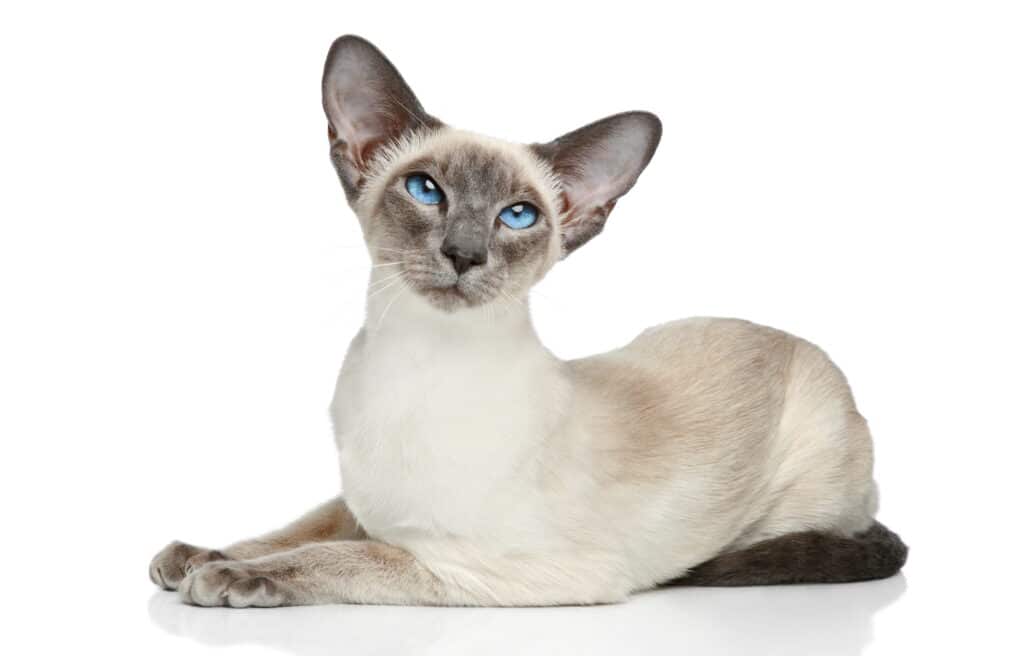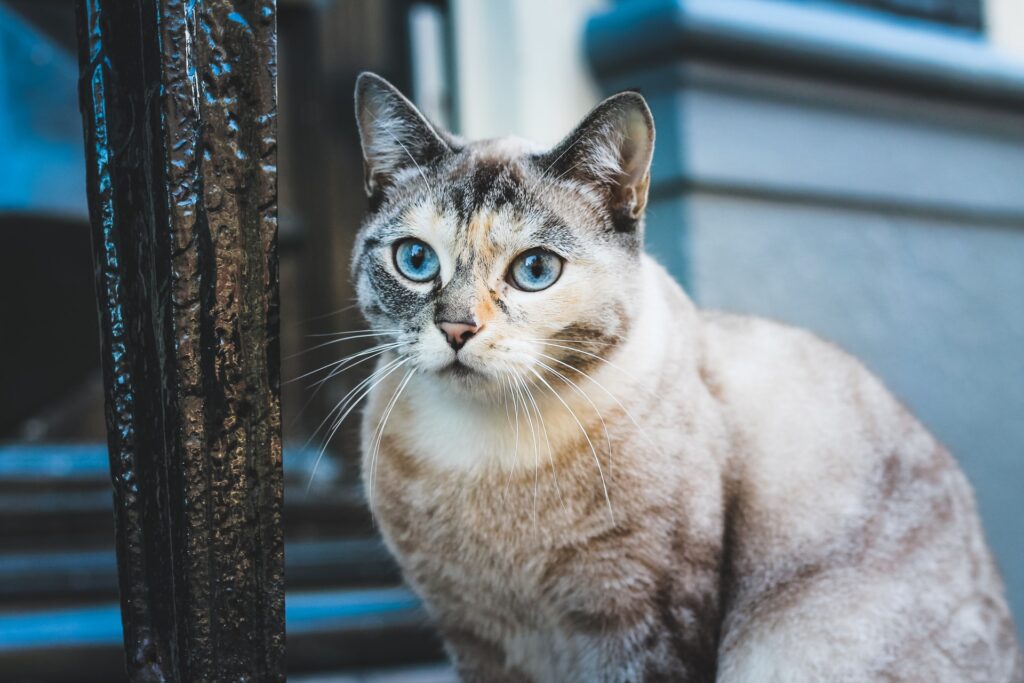Why is my cat meowing so much all of a sudden?
A cat meowing a lot can test anyone’s patience. Frustrated pet parents may end up asking, “Why is my cat meowing so much all of a sudden?”
The reasons for meowing change as kittens mature to cats.
When kittens are hungry, cold, or terrified, they meow to get their mother’s attention.
As cats grow older, they use other vocalizations to communicate with each other, such as yowling, hissing, and growling. Cats reserve meowing for interactions with their pet parents.
Why is my cat meowing so much all of a sudden?
To answer your question, we need to first look at a few facts:
Meowing varies by breed

The amount of meowing varies based on the breed and even individual cats.
Oriental breeds, like Siamese cats meow a lot, thus anyone who dislikes meowing should avoid these cats.
Understand the cause
Some cats enjoy hearing their own voices, while others like talking with their owners.
If your cat is talking more than you’d like, attempt to figure out what’s causing it in the first place. Once you’ve determined the cause, you can focus on getting your cat to meow less.
Make sure there is no problem
Don’t dismiss anything without first confirming that there isn’t a problem.
Although you don’t want to reward meowing, there are occasions when cats meow for a good reason:
- They can’t reach their litter box.
- They’re stuck in a room.
- The water bowl is empty.
When your cat meows, check to see if it’s something you can ignore or if its an issue you have to address right away.
Don’t punish your cat
Resist the urge to scold your cat for meowing.
Hitting, yelling, and spraying water does not help to silence a meowing cat. Such punishments will make your cat distrust or even resent you.
Don’t give in
Don’t give in to the pressure from your cat.
If your cat often receives what he wants by meowing, he will meow more and louder when it stops working.
In other words, it’s likely to grow worse before it gets better. Keep rewarding good behavior and ignoring meowing, and they’ll catch on.
When should you be concerned
It may be more important to consider any recent changes in your cat’s meowing.
Meowing in cats is similar to barking in dogs. Some dogs bark at the smallest things, while others barely ever bark at all. So, if your cat’s behavior has changed in any way, it’s worth talking to your vet about it.
If a cat starts meowing all the time, vocalizes when jumping on and off furniture, or when you handle him, it could indicate a problem.
Meowing that suddenly becomes louder or softer, more frequent, or changes pitch, or tone could also indicate something is wrong.
You are the most knowledgeable about your cat. Changes in behavior, patterns of activity, or vocalizations should be considered warning indicators.
12 reasons why your cat might become hyper vocal

1. Heat
You can expect an increase in vocalization during mating season when male cats compete for access to female cats in heat.
Is your cat sterilized or neutered? If not, they could be on the lookout for love. These cries will sound more like howls than meows that say, “feed me, I’m hungry.”
The solution is to follow your veterinarian’s recommended spay/neuter schedule prior to the onset of these surging hormones.
If your male cat isn’t neutered and he meows too much, he may be hearing or smelling a female cat in heat.
2. Boredom
If your cat is bored, he will let you know by constantly meowing.
Make a point of rotating through interesting toys and devoting some time each day to play and exercise your cat. You can also consider getting a feline companion!
Increase the number of climbing and hiding areas for cats, such as cat trees, cat tents, and perches near windows.
3. Losing hearing and eyesight
Keep a close eye on your cat. If he is tripping over things or more hesitant to jump, it’s probably time to take your cat to the veterinarian to find out what’s wrong.
4. Sickness
Kidney problems are prevalent in senior cats. If your cat is getting older, we recommend twice-yearly visits to monitor their health. You don’t want your cat to become ill.
Additionally, cats might develop hyperthyroidism or kidney illness, both of which can result in excessive vocalization.
If you see changes in behavior, activity, or vocalizations, they should be warning signs. Chances are you’ll see other symptoms if the changes in meowing are due to a medical problem.
This implies that, during the early stages of illness, a cat owner may notice merely that the cat has become quiet and aloof.
5. Pain
Cats who meow a lot are attempting to communicate with you, and it’s possible that they’re in pain. Because they can’t tell you where it hurts, you’ll have to look for hints. Is your feline suddenly having difficulty using the litter box? Signs of a urinary tract infection, for example, include particularly frequent use of the litter box.
6. Requesting affection
When cats are in good health and have always been loud, they may be saying “hello” or requesting affection.
Cats like social contact with people, and some will be extremely vocal in their requests for attention.
The cat may like to be stroked, played with, or simply conversed with. Cats who are left alone for lengthy periods of time each day may meow for attention.
7. Wants to eat
Some cats meow whenever someone enters the kitchen, hoping for a bite.
When it comes to mealtime, many cats get extremely loud. If this is the case, do not feed your cat when he is crying. Wait until he is calm before putting food down, and don’t offer him a treat if he meows.
If this doesn’t work, invest in an automatic feeder that opens at certain intervals. Kitty will now meow at the feeder rather than you.
8. Seeking attention
Cats, contrary to popular belief, dislike being alone.
Cats frequently meow in order to initiate play, caressing, or to get you to speak to them.
Stop responding to attention-seeking meows if you want to reduce them.
Give your cat attention only when he is silent. If they start meowing again, take a look or walk away. However, do not disregard your pet.
Try to spend time with your cat every day, playing, grooming, and talking to him. A tired pet is a more quiet pet.
9. Welcoming you
Many cats meow when their owners return home or even merely greet them in the house. Its difficult to change this habit, but think of it as your kitten greeting you.
10. Depressed
If your pet spends too many hours alone each day, consider hiring a pet sitter to improve your pet’s life.
You can place a bird feeder outside a window where your cat can see it.
Allow foraging toys to be left out with food inside.
Get them a kitty condo and rotate the toys you set out for them to play with.
11. Stressed
When cats are stressed, it can result in excessive vocalization.
A new pet or newborn, a transfer or change in the home, illness or the loss of a loved one can all cause your cat to become a talker.
Try to figure out what is bothering your pet and assist them in adjusting to the change. If that isn’t possible, pay additional attention to your cat to help relax them.
12. Aging

Cats suffering from dementia may meow excessively or loudly.
As cats age, they can develop a type of mental confusion or Cognitive dysfunction syndrome (CDS). This is comparable to cognitive dysfunction in dogs and Alzheimer’s disease in people. Senior cats over the age of ten are the most usually affected.
Symptoms of cognitive dysfunction syndrome in cats:
- Disorientation (aimless wandering)
- Changes in social interactions (changes in mood or temperament)
- Sleep-wake cycle shifts (awake at night, night vocalization)
- Soiling in the home
- Variations in activity level
- Difficulty adapting to new situations
- Difficulty remembering or learning
If your senior cat is over the age of ten and has recently started meowing loudly or incessantly, have him inspected by your veterinarian.
Consult your vet
Now that you’re aware of a few of the most probable causes of your cat’s excessive meowing, consider whether this is a recent occurrence. If this is the case, immediately schedule a vet visit to rule out any significant health issues.
Training
If you’ve had your cat checked out and he appears to be healthy but still a little “meowy,” you can try these cat training ideas.
Wait for your cat to quit meowing and don’t acknowledge him.
Reward him right away if he’s silent. He’ll stay silent for a short period of time at first, but if you only treat him when he’s not meowing, he’ll gradually discover that staying quiet is preferable to vocalization. You might gradually increase the amount of time you ask him to be quiet before offering the reward.
Using a clicker is the most convenient approach to do “silent” training. When the cat isn’t meowing, click and quickly offer a reward. Clicker training is a really efficient approach to communicate with your cat about what you expect from him.
Conclusion
We hope that your question “Why is my cat meowing so much all of a sudden?” has been answered. If your cat is meowing for attention, you can train him out of the behavior. However, make sure to set aside time to play with your cat and also provide adequate exercise and mental stimulation. If you notice a sudden increase in meowing or variations in tone, you must definitely have your cat checked out by a vet.






